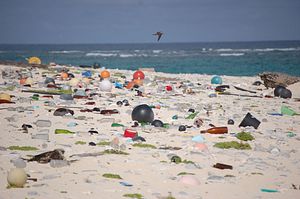Growing populations and rising levels of urbanization across the Asia-Pacific region have led to a mounting crisis: how to manage the increasing amounts of plastic waste produced. The problem of waste in the region is exacerbated along economic lines, with wealthy countries exporting the majority of their rubbish to the developing nations of the Asia-Pacific. Last month, new international laws were ratified to regulate the international waste trade, and to improve the rights of importing nations such as Thailand, the Philippines, and Malaysia.
The problem of waste in the region has built up over the last 40 years. As the world’s reliance on plastics grew, so too did our garbage. In the 1980s, developed nations began tightening legislation surrounding waste disposal and health standards. As a result, in order to avoid their own environmental regulations and the high cost associated with them, wealthy nations began to export their rubbish to developing nations. Rather than managing and containing their own plastic and hazardous waste, developed nations exported it by the container load to developing nations, which lacked adequate facilities to store or dispose of it. In the 1980s a new term was coined to describe this practice: “Waste colonialism.”
In 1989, in response to the growing environmental problem of waste colonialism, the Basel Convention sought to manage the transboundary movement of waste. However, the Basel Convention failed to completely protect developing nations. In order to balance competing interests, the Convention did not ban the importing or exporting of waste, but rather it concerned itself with the types of waste that could be exported with government consent. Since 1989, global waste management has operated on the principle of developed nations bypassing the governments of developing countries by selling their waste directly to the private waste companies without government consent.
By 2012, China was importing nearly half of the world’s waste. However, last year, China disrupted the global waste trade by banning the import of plastic and other waste materials. Wealthy nations scrambled to find new countries to export their waste to. Other countries in the region, such as Thailand, Malaysia, the Philippines, and India, are struggling to cope with the influx in waste imports that China used to manage. Waste is now being kept in warehouses in Australia, Canada, and the United States waiting to be exported.
Much of the “recyclable” waste sent to the developing nations is unsorted and in a condition unsuitable for recycling. Even if it is in a recyclable condition, many of the import countries lack the proper management facilities and instead resort to landfills or incineration, increasing the environmental impact on the oceans and air quality. These problems are compounded by the increasing urbanization of the Asia-Pacific region. As urban centers’ populations boom, so does domestic rubbish, and the importing countries are struggling to manage their own urban waste as well as new foreign imports.
For many years, the economic benefits of importing waste seemed to outweigh the societal and environmental harms. However, across the region the mood is quickly shifting. A clean environment is seen as a right for all nations, not just the wealthy. Photos circulated online of previously pristine Thai beaches now carpeted with plastic rubbish, and all 50 of the world’s most polluted cities are in the Asia Pacific region.
Developing nations are no longer willing to receive metric tonnes of untreated, unsorted rubbish. Refusing foreign countries’ rubbish has become a patriotic stance, and the idea of waste colonialism has reappeared. Malaysia announced that it “will not be the dumping ground of the world,” and the Philippines has invoked their sovereignty and turned back 69 containers of waste to Canada. A spokesperson for Philippine President Rodrigo Duterte stated, “The Philippines as an independent sovereign nation must not be treated as trash by [another] foreign nation.”
Thirty years after the Basel Convention was first ratified in 1989, the economic lines of waste management are still present, but now the developing countries have the support of international law to combat the inequalities. Last month, 187 countries agreed to and passed an amendment, which now requires consent from the importing countries before the shipping of waste, regardless of whether or not it has been sold to a private waste management company. From 2020, the Malaysian, Philippine, and Thai governments have the right to refuse waste that they did not consent to importing.
There is still room for improvement in the regulation of the global waste trade. The world’s second largest waste producer, the United States, is not a party to the Basel Convention; e-waste is a rising problem; and there is a lack of international support in creating adequate waste management facilities in the Asia-Pacific.
However, the guidelines set by the Basel Convention, and the changing norms across the Asia-Pacific region, signify a key shift in how the region perceives the global trade of waste, and provide the countries with the agency to determine what their role will be in the global waste trade system.
Shona Warren holds a Master’s of International Relations from the University of Melbourne.

































